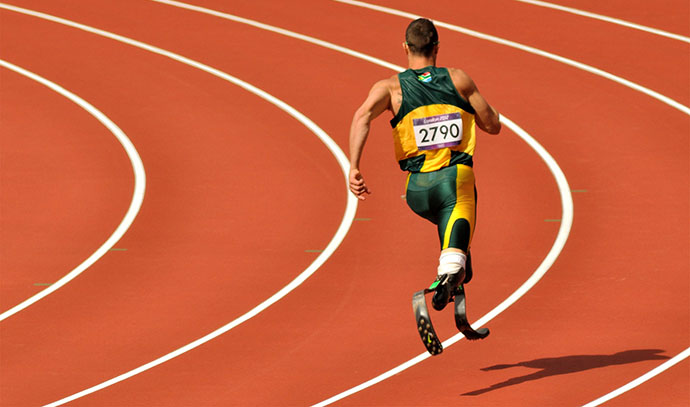Ogmius exchangeIntroduction
|
STEPPS: Science, Technology, Policy And Politics Of Sportby Roger Pielke, Jr. |
Here at the CIRES Policy Center we’ve started up a new research program focused on the governance of sport. The program has been in the works over the past several years after I discovered how closely related many questions of sports governance are to more common topics found within the field of science and technology policy. A few years ago when teaching a seminar on science and technology studies, I developed two units that used sports as a context for exploring some difficult topics. One case focused on technological augmentation of the human body. We looked at the case of Oscar Pistorious and the policies which governed how athletes who use prosthetics would be eligible to participate in the Olympics, competing against athletes who did not use prosthetics. The case raised challenging questions about what it means to be human, what it means to be augmented, and the role of technologies in our lives. Ultimately, the case came around to policies – what rules should govern technological augmentation in sport? A second case that we looked at was that of Caster Semenya, the South African runner. After she dominated the field in the 2009 World Championships she found herself in the middle of a gender controversy, with allegations made that she should be deemed ineligible to run with women. Semenya was ultimately vindicated, but the case raises the question of what it means to qualify to compete in women’s athletics events. As on many topics, an initial reaction to sex and sports is to hand off the issue to scientists and ask them to determine a bright line that can be used in a decision making setting. But like so many areas, there is no bright line, but many shades of gray. Determining who is eligible to compete in women’s sporting events turns out to highlight many of the challenges of using science in decision making. Cases like these led us to create a new research program, called STePPS: Science, Technology, Policy and Politics of Sport. We are interested in questions of governance, especially as they are related to science and technology. We have also partnered with the Department of Ethnic Studies where there is a new certificate program in Critical Sports Studies. This semester I am teaching a course on The Governance of Sport, and for our final class project we are holding an Oxford-style debate on the issue of unionization and college athletics. In March 2014 the National Labor Relations Board ruled that football players at Northwestern University would be allowed to unionize in order to secure labor rights as university athletes. Northwestern University immediately appealed the decision. Kain Colter, the Northwestern quarterback, explained: “Right now the NCAA is like a dictatorship. No one represents us in negotiations. The only way things are going to change is if players have a union.” The NCAA opposed the move: “This union-backed attempt to turn student-athletes into employees undermines the purpose of college: an education. Student-athletes are not employees, and their participation in college sports is voluntary.” Students in my class are taking different sides of this issue and we are holding the debate at our department of athletics. The question of unionization is part of a bigger debate about the role of big-time college athletics on university campuses. Science and technology policy scholars typically address many questions related to the governance of the modern university. But athletics are rarely a focus. With STePPS we hope to bring together an impressive body of scholarship, methods and expertise, with a part of society that deserves greater scholarly attention. You can find our new project online http://sciencepolicy.colorado.edu/stepps.We’d love your feedback! Roger Pielke, Jr. |



 In this issue of Ogmius our exchange article by Center director Roger Pielke, Jr., describes a new program at CSTPR, STePPS: Science, Technology, Policy and Politics of Sport, which focuses on the governance of sport, with a special emphasis on the roles of science and technology in how sport is governed. Roger has been on the faculty of the University of Colorado since 2001 and is a Professor in the Environmental Studies Program and a Fellow of the Cooperative Institute for Research in Environmental Sciences (CIRES). Roger’s research focuses on science, innovation and politics. In 2011 he began to focus on the governance of sports organizations, including FIFA and the NCAA. Roger recently launched
In this issue of Ogmius our exchange article by Center director Roger Pielke, Jr., describes a new program at CSTPR, STePPS: Science, Technology, Policy and Politics of Sport, which focuses on the governance of sport, with a special emphasis on the roles of science and technology in how sport is governed. Roger has been on the faculty of the University of Colorado since 2001 and is a Professor in the Environmental Studies Program and a Fellow of the Cooperative Institute for Research in Environmental Sciences (CIRES). Roger’s research focuses on science, innovation and politics. In 2011 he began to focus on the governance of sports organizations, including FIFA and the NCAA. Roger recently launched 